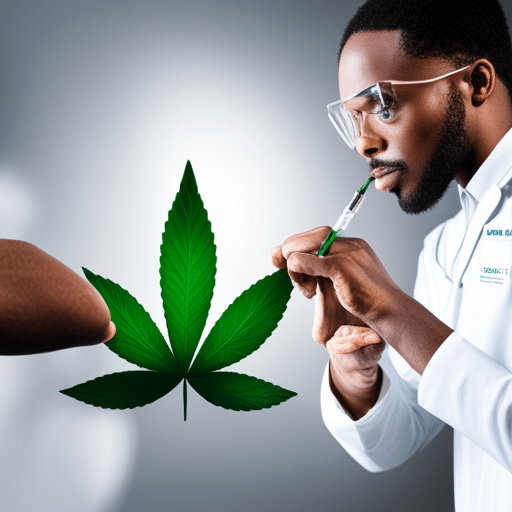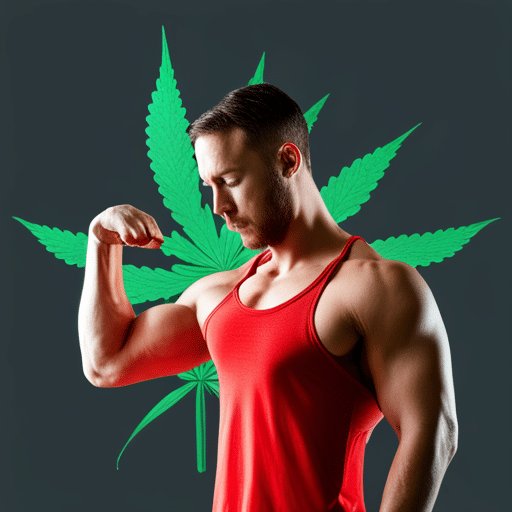The utilization of medical cannabis has steadily gained traction in recent years, with many individuals seeking its potential therapeutic benefits for a myriad of health conditions. A growing body of evidence supports the use of medical marijuana for the management and alleviation of symptoms related to chronic pain, spasticity, and other debilitating conditions. Consequently, this burgeoning interest has led to inquiries into whether or not Maryland’s medical marijuana program can provide athletes with an avenue for enhanced physical performance. This article aims to delve into the science behind medical cannabis, assess its potential benefits and risks for athletes, and explore legal implications surrounding its use.
As athletic performance is contingent upon factors such as endurance, strength, flexibility, mental fortitude, and recovery time from injuries or intense workouts, it is imperative to consider how medical marijuana may influence these aspects. The underlying mechanisms through which pharmacological agents exert their effects on the human body are crucial in determining their suitability as performance-enhancing substances. Thus, an examination of real-life examples and testimonials shall be conducted in order to elucidate the effectiveness of Maryland’s medical marijuana program in enhancing athletic prowess while maintaining patient-focused care. This exploration shall strive to illuminate whether incorporating medical cannabis into an athlete’s regimen could ultimately lead them towards achieving liberation from pain-induced limitations or other impediments that encumber optimal performance levels.
Key Takeaways
– Medical marijuana has shown promising results in treating chronic pain, anxiety disorders, spasticity associated with multiple sclerosis, and other debilitating conditions that hinder athletic performance.
– CBD possesses strong anti-inflammatory properties without inducing psychoactive effects typically associated with THC usage, making it a potential solution for exercise-induced oxidative stress, muscle soreness, and joint pain.
– Athletes and medical professionals should weigh the potential benefits against potential side effects and regulatory challenges when considering medical marijuana as a treatment option.
– Understanding specific regulations imposed by sports organizations is crucial for athletes to avoid potential penalties or disqualification from competition due to cannabis use.
The Science Behind Medical Cannabis

Extensive research on medical cannabis elucidates its potential in ameliorating various physiological and psychological conditions, which may subsequently contribute to an athlete’s enhanced physical performance. The underlying mechanism of action involves the interaction of active compounds found in the cannabis plant, primarily cannabinoids such as tetrahydrocannabinol (THC) and cannabidiol (CBD), with the human body’s endocannabinoid system. This system plays a crucial role in regulating numerous physiological processes like pain sensation, inflammation, mood, appetite, and sleep. The presence of cannabinoid receptors (CB1 and CB2) throughout the nervous system facilitates this regulation. Consequently, targeting these receptors through therapeutic applications of medical marijuana has shown promising results in treating chronic pain, anxiety disorders, spasticity associated with multiple sclerosis, and other debilitating conditions.
The ability of medical cannabis to alleviate symptoms that hinder athletic performance is particularly significant for athletes seeking alternative treatment options. For instance, research indicates that CBD possesses strong anti-inflammatory properties without inducing psychoactive effects typically associated with THC usage; thus offering a safer option for managing musculoskeletal inflammation following intense exercise or injury. Moreover, studies have demonstrated the efficacy of cannabinoids in reducing exercise-induced oxidative stress – a critical factor contributing to muscle fatigue and reduced endurance capacity in athletes. By mitigating such negative impacts on physical performance while simultaneously addressing mental health aspects like anxiety management or promoting restorative sleep patterns for optimal recovery time between training sessions or competitions; medical marijuana presents a unique multidimensional approach to support athletes’ overall well-being and success within their respective sports disciplines.
Potential Benefits for Athletes

Numerous advantages could be reaped by athletes through the utilization of medical cannabis, including pain management, reduced inflammation, and improved sleep quality. For athletic recovery, the analgesic properties of cannabinoids can provide relief from post-exercise muscle soreness and joint pain. Additionally, the anti-inflammatory effects of certain compounds in cannabis may support athlete’s efforts to minimize tissue damage and promote faster healing. Furthermore, cannabinoids like CBD have been shown to improve sleep quality by promoting relaxation and regulating sleep patterns – a vital aspect for optimal performance and recovery.
1. Pain Management: Medical marijuana has been widely recognized for its potential in managing various types of pain due to its analgesic properties. Athletes who suffer from chronic or acute discomfort might benefit from this alternative treatment option.
2. Reduced Inflammation: The anti-inflammatory effects of cannabinoids can aid in reducing swelling and inflammation caused by intense physical activity or injury, thus helping with more rapid recovery.
3. Mental Focus: Cannabis has been found to enhance focus in some individuals when used at appropriate doses; this increased attentiveness could lead to better decision-making skills during athletic competitions or training sessions.
The potential benefits offered by medical marijuana for athletes warrant further exploration into how these applications may contribute towards enhancing their physical performance while minimizing adverse side-effects. By examining patient-focused research studies that analyze the efficacy of cannabis as a therapeutic modality within sports medicine contexts, practitioners may be able to develop evidence-based recommendations that cater to individual needs while promoting overall well-being and liberation for all patients involved in athletics activities
Risks and Drawbacks

While the potential benefits of medical cannabis for athletes are promising, it is crucial to consider the associated risks and drawbacks that may impact their overall health and performance. Cannabinoid safety remains a significant concern as there are potential side effects, such as dizziness, impaired memory, anxiety, and paranoia. Moreover, some studies indicate that chronic use of cannabis may lead to dependence or addiction. Performance interference is another critical aspect to consider since marijuana’s psychoactive properties may affect an athlete’s concentration, reaction time, and coordination.
| Risks/Drawbacks | Possible Consequences | Considerations |
|---|---|---|
| ——————- | ——————————— | ————————————— |
| Cannabinoid Safety | Side effects (e.g., dizziness) | Proper dosing and administration |
| Impaired memory | Monitoring cognitive function | |
| Anxiety & Paranoia | Psychological support | |
| Performance Interference | Reduced concentration | Balancing therapeutic vs. performance needs |
| Slower reaction time | Integration of alternative therapies |
It is essential for athletes and medical professionals to weigh the potential benefits against these risks when considering medical marijuana as a treatment option. To ensure optimal outcomes for both health enhancement and athletic performance, careful consideration should be given to factors such as appropriate dosing regimens and alternative therapies with fewer side effects. By adopting an evidence-based approach in conjunction with patient-focused care strategies, the medical community can better serve the unique needs of athletes seeking liberation from pain while maintaining peak physical capacity through safe and effective treatments.
Legal Implications and Regulations

Navigating the complex landscape of legal implications and regulations surrounding medical cannabis for athletes remains a significant challenge, with evolving policies and varying degrees of acceptance worldwide. Legal obstacles and regulatory challenges further complicate athletes’ access to medical marijuana for performance enhancement or recovery purposes. In the United States, the use of marijuana remains illegal under federal law; however, individual states have adopted their own legislation regarding its medicinal use. As such, while an athlete may be able to obtain a prescription for medical marijuana in Maryland or other states where it is permitted, they may still face potential sanctions from sports governing bodies if they test positive for cannabis.
The World Anti-Doping Agency (WADA) has recently updated its list of prohibited substances, removing cannabidiol (CBD) as a banned substance but maintaining restrictions on THC – the psychoactive compound found in marijuana that is responsible for its intoxicating effects. This change acknowledges the potential therapeutic benefits of CBD but highlights ongoing concerns about THC’s impact on athletic performance and safety. Athletes must remain vigilant in understanding the specific regulations imposed by their respective sports organizations and adhere to these rules to avoid potential penalties or disqualification from competition due to cannabis use. Additionally, navigating international competitions can present further complexities given that regulations vary between countries and may not align with an athlete’s home country prescriptions or allowances.
Real-life Examples and Testimonials

Real-life examples and testimonials provide valuable insights into the potential benefits and challenges athletes face when incorporating medical cannabis into their training, recovery, and overall wellness routines. Many professional and amateur athletes in Maryland have reported that medical marijuana has been a game-changer for them in terms of athlete recovery and training optimization. For instance, some athletes indicate that cannabis helps alleviate pain from injuries or sore muscles, reduces inflammation, aids sleep quality, and even assists with mental focus during periods of intense physical exertion.
A growing body of research supports these anecdotal claims as well. Studies suggest that cannabinoids—particularly cannabidiol (CBD)—have promising therapeutic applications in sports medicine due to their anti-inflammatory, analgesic, neuroprotective, and anxiolytic properties. These findings are consistent with the experiences shared by many Maryland athletes who sing the praises of medical marijuana as a safe and effective alternative to pharmaceuticals for managing pain, promoting relaxation, mitigating stress-related symptoms like anxiety or depression associated with high-performance athletics. While more research is needed to fully understand the ideal dosages and delivery methods for optimal results among different athletic populations, evidence thus far suggests that Maryland’s medical marijuana program could potentially benefit numerous individuals seeking to enhance their physical performance through natural means.
Frequently Asked Questions
How does the process of obtaining a medical marijuana card in Maryland work for athletes specifically? Are there any additional requirements or considerations for them?
Athlete eligibility for obtaining a medical marijuana card in Maryland involves standard procedures without additional requirements. Card restrictions apply universally, ensuring equitable access and maintaining patient-focused healthcare policies.
Are there any sports organizations or teams in Maryland that openly support or endorse the use of medical marijuana for enhancing physical performance?
Cannabis endorsement by sports organizations in Maryland remains limited, as alternative supplements dominate the athletic sphere. However, a growing interest in evidence-based, patient-focused approaches may prompt future support.
What are some alternative methods or treatments that athletes can consider if they cannot or do not want to use medical marijuana for performance enhancement?
Alternative treatments for athletes seeking performance enhancement encompass various approaches, focusing on mental focus and physical well-being. Evidence-based methods include yoga, meditation, acupuncture, and nutritional supplements to promote optimal health and athletic prowess.
How do the effects of medical marijuana on athletic performance differ between various sports, if at all? Are there specific sports where it may be more beneficial or detrimental?
Cannabinoid recovery varies across sports, with potential sport-specific benefits. Research indicates improved endurance in long-distance events; however, detrimental effects may occur in sports requiring precision and coordination.
How do athletes manage the stigma or public perception surrounding the use of medical marijuana for performance enhancement? Are there any known strategies for addressing this issue?
Stigma management strategies employed by athletes include education, open dialogue, and sharing personal experiences. Addressing public perception requires promoting evidence-based research and demonstrating the benefits for patient-focused outcomes.
